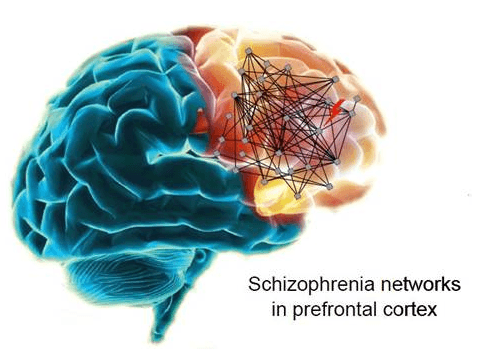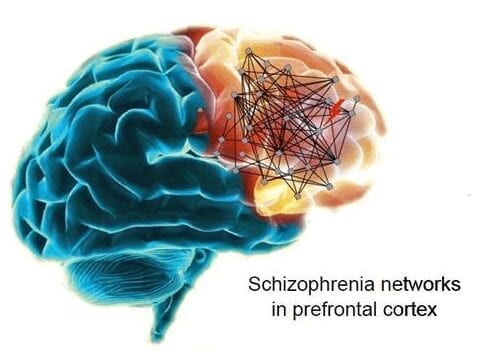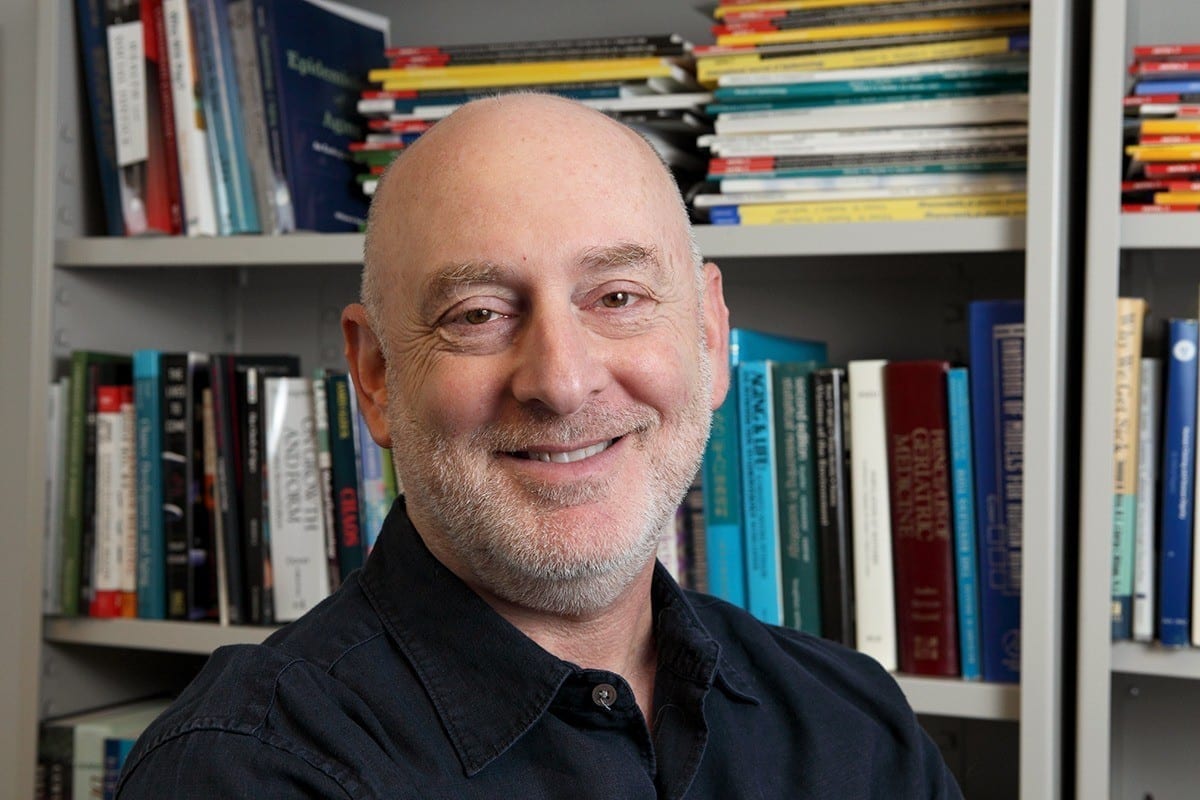
A visual representation of the mutated gene networks that may contribute to one cause of schizophrenia
In one of the biggest breakthroughs in schizophrenia research in recent times, Professor Cynthia Shannon Weickert at Neuroscience Research Australia (NeuRA) has identified immune cells in greater amounts in the brains of some people with schizophrenia. The study published today in Molecular Psychiatry has the potential to transform global schizophrenia research and open new avenues for developing targeted immune cell therapies.
One in every 100 Australians lives with schizophrenia. No single cause of schizophrenia has been identified, and this has prevented the development of a cure. The current treatments for schizophrenia are designed to suppress symptoms rather than target underlying causes of the disorder. These drugs only partially relieve symptoms and can produce unwanted side effects.
To recognise the significance of this discovery Professor Shannon Weickert says you first need to understand most scientists have had a long held belief that immune cells were independent from the brain pathology in psychotic illnesses.
“In our study, we challenged this assumption that immune cells were independent of the brain in psychiatric illness and made an exciting discovery. We identified immune cells as a new player in the brain pathology of schizophrenia,” said Professor Shannon Weickert.
Current schizophrenia research has focused on the status of three brain cells: the neurons; the glial cells, which support the neurons; and the endothelial cells, which coat the blood vessels. Employing new molecular techniques allowed Professor Shannon Weickert and her team to identify the presence of a fourth cell, the macrophage, a type of immune cell in the brain tissue of people with schizophrenia who show high levels of inflammation.
Professor Shannon Weickert said immune cells have previously been ignored as they had long been viewed simply as travelers just thought to be passing by, undertaking surveillance work. They have never been a suspect until now.
“To find immune cells along the blood brain barrier in increased amounts in people with schizophrenia is an exciting discovery. It suggests immune cells themselves may be producing these inflammatory signals in the brains of people living with schizophrenia,” said Professor Shannon Weickert.
“We have observed in people with schizophrenia, the glial cells, one of the local residents, become inflamed and produce distress signals which change the status of the endothelial cells.
“We think this may cause the endothelial cells to extend sticky tentacles, so when the immune cells travel by some are captured. These cells may transmigrate across the blood brain barrier entering the brain in greater amounts in some people with schizophrenia compared to people without the disorder.”
This discovery shows that specific immune cells are in the brains of some people with schizophrenia in close enough proximity to the neurons to do damage.
Professor Peter Schofield, CEO of NeuRA said this innovative new research has the ability to alter the way in which we may be able to diagnose and treat schizophrenia.
“This breakthrough demonstrates the value of the NSW Government’s support for Professor Shannon Weickert as NSW Chair of Schizophrenia Research, which has delivered new insights that the community seeks,” said Professor Schofield.
Professor Shannon Weickert is encouraging a cross-collaborative approach between neuroscientists and immunologists globally, to work together to develop treatments targeting this abnormal immune pathology of schizophrenia.
“This opens whole new avenues for therapy, because it suggests that the pathology of schizophrenia could be within the immune cells and the immune cells could be contributing to the symptoms of schizophrenia,” said Professor Shannon Weickert.
Professor Shannon Weickert is uniquely motivated in her work, with her twin-brother being diagnosed with schizophrenia when he was 17 years old.
Learn more: Schizophrenia breakthrough
The Latest on: Schizophrenia
[google_news title=”” keyword=”schizophrenia” num_posts=”10″ blurb_length=”0″ show_thumb=”left”]
via Google News
The Latest on: Schizophrenia
- New study into identical twins suggests a possible treatment for people with schizophrenia disorderon May 7, 2024 at 4:11 pm
Research led by Prof. Shani Stern at the University of Haifa unveils genetic discrepancies in schizophrenia discordant monozygotic twins, offering insights for treatment.
- Haifa University, Salk Institute Report Findings on Genetic Causes of Schizophreniaon May 7, 2024 at 12:50 pm
The researchers chose to examine genetic differences between individuals who would not be expected to show such differences – pairs of identical twins, who should share the same DNA sequence, where ...
- INCREDIBLE SHRINKING BRAIN Shows the Physical Realities Behind Depression, Bipolar Disorder and Schizophrenia.on May 7, 2024 at 8:00 am
Respected psychiatrist states physical brain conditions are connected to depression, bipolar disorder, and schizophrenia in Palmetto Publishing’s latest book. The Incredible Shrinking Brain cover ...
- Battling schizophrenia for 8 years, Nair Hospital staffer jumps to death from 15th floor of apartmenton May 6, 2024 at 11:30 pm
Mumbai: A tragic incident unfolded on Monday afternoon after a 33-year-old employee of Nair Hospital in Mumbai Central died by allegedly jumping from the 15th floor of his apartments located ...
- A Sometimes Overlooked Schizophrenia and Psychosis Symptomon May 5, 2024 at 6:36 am
Emotional blunting is a common but often under-discussed symptom of schizophrenia. This isn't an absence of emotion, but an alteration and disconnect. There is help.
- Cat owners could be at higher risk of schizophrenia, study suggests, but more research neededon May 2, 2024 at 1:07 pm
Cat cuddles might seem therapeutic, but a study suggests this could have adverse mental health effects down the road. The study researcher and a psychologist weighed in on the findings.
- Max and Iggor Cavalera Announce Re-Recording of Sepultura’s Schizophrenia, Unveil “Escape to the Void”: Streamon May 1, 2024 at 11:15 am
The latest re-recorded early Sepultura album by the Cavalera brothers. Max and Iggor Cavalera Announce Re-Recording of Sepultura’s Schizophrenia, Unveil “Escape to the Void”: Stream ...
- Newron’s add-on schizophrenia therapy finds success in Phase II/III trialon May 1, 2024 at 3:22 am
The therapy met endpoints in the Phase II/III trial, with Newron considering a pivotal Phase III study in patients with treatment-resistant schizophrenia.
- Newron's schizophrenia add-on improves symptoms, charging up case for phase 3 teston April 30, 2024 at 2:13 am
Newron Pharmaceuticals’ add-on schizophrenia treatment improved both positive and negative symptoms as well as severity in patients with the disorder during a phase 2/3 study. The Italian biotech is ...
via Bing News











